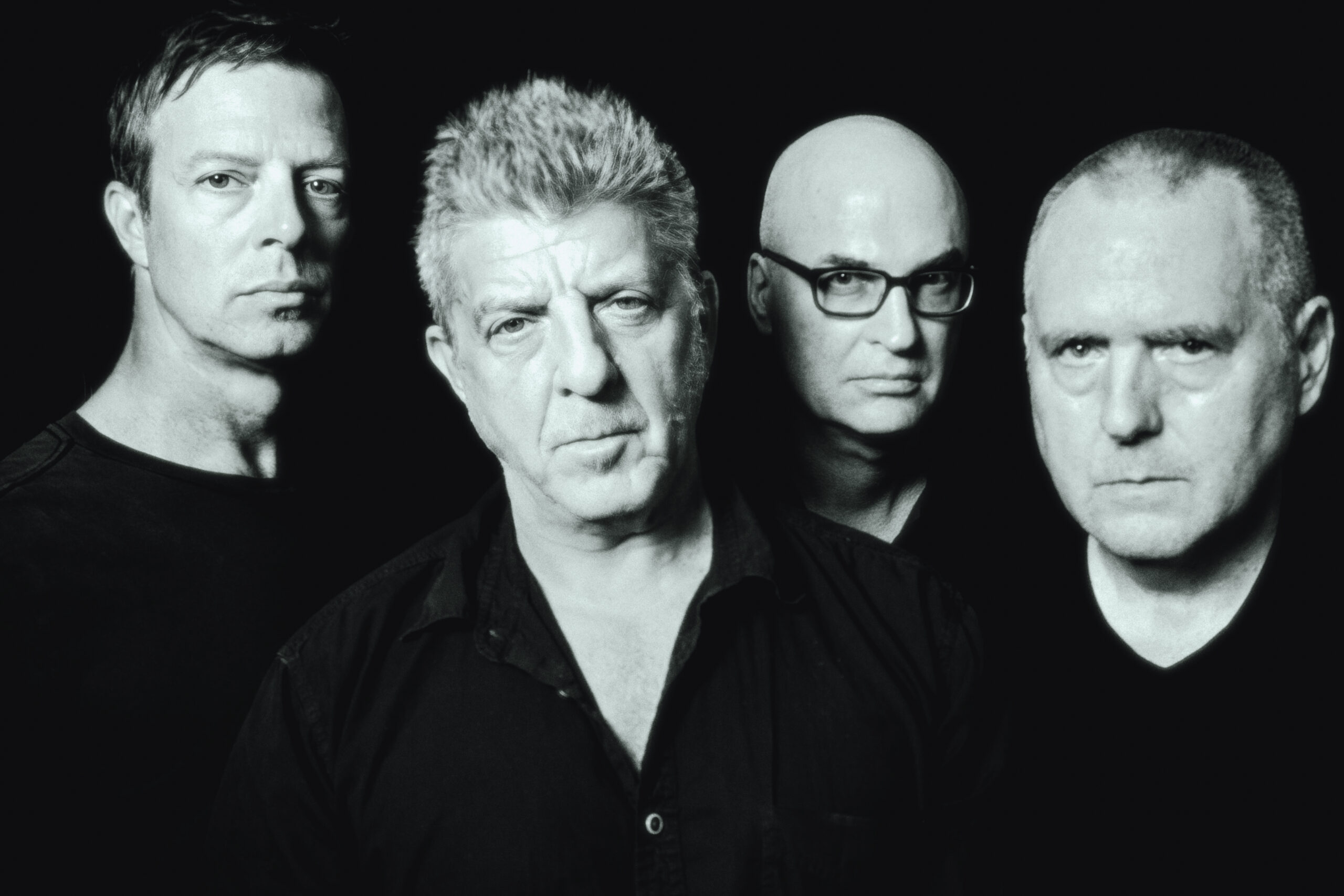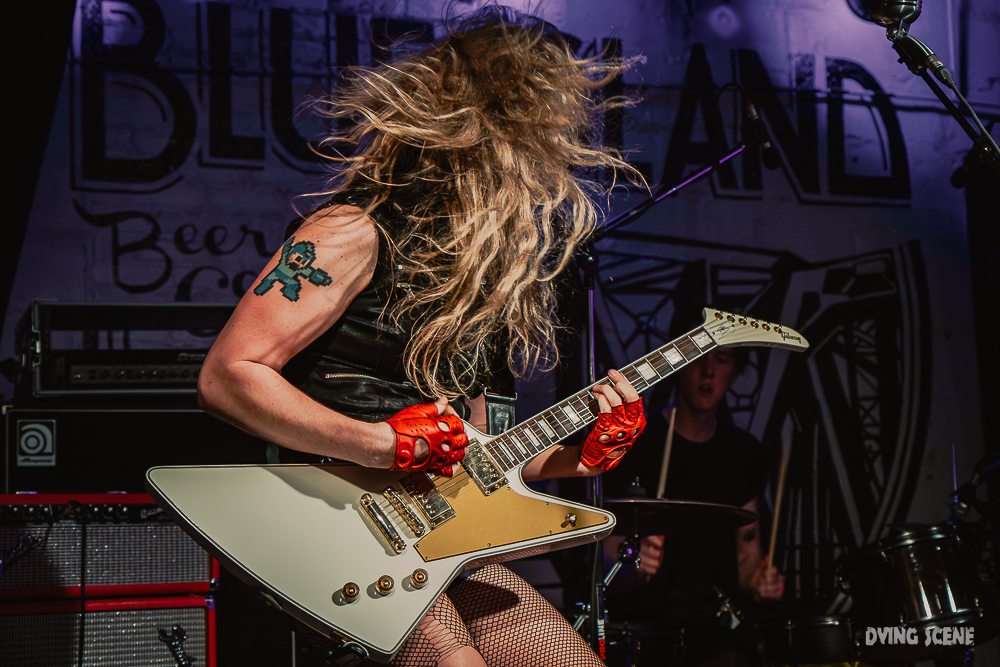Feature Photo Credit: Jesse Pace
The Effigies was one of the pioneering bands in the early Chicago punk scene. On December 20, 2024, the group will headline a show at Metro. The show will celebrate both the new The Effigies album, Burned, and John Kezdy, who passed away during recording. Kezdy died August 26, 2023, days after he was hit by a truck whilst bicycling in Glencoe, IL.
At the show, The Effigies will be supported by The Bollweevils, Ganser, and DJ Joe Shanahan, Metro’s founder/owner. It promises to be both exciting and poignant and will serve as an introduction to the band for many potential new fans.
Ahead of the show, I interviewed The Effigies bass player Paul Zamost. Geoff Sabin, who stepped in on vocals after the death of Kezdy, added his reflections as well.
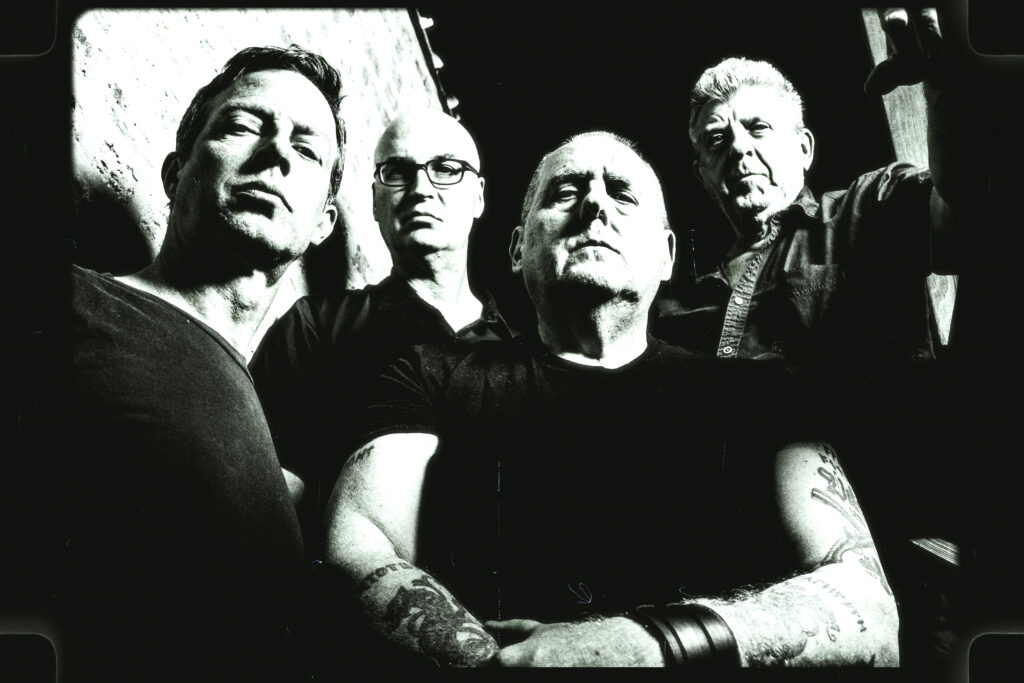
Dying Scene: What prompted the 2022 return?
Paul Zamost (PZ): In retrospect, we just needed a nudge, I think we all felt we had unfinished business when it came to The Effigies. So during Covid, shortly after lockdown, I got a call from Steve Economou about recording “Guns or Ballots,” and “Everything’s Coming Off” as a side project which I agreed to because I was itching to play anything at the time. But of course, Steve had ulterior motives, and his plan to revive the band was launched, so me and Steve got together to jam and ended writing 4 songs and the ball was rolling.
What went into creating the music for Burned?
PZ: Enter guitarist Keith Shigeta. Keith is a friend of my oldest son Zachary (drums), and they had a metal band called Lost in Blue. They used to practice in my basement, so I was quite familiar with his abilities on guitar, so when the opportunity to have him for play on some recording sessions arrived, we seized on it, his writing and playing contributions to Burned are tremendous, but unfortunately, Keith couldn’t commit to playing shows and is working on his own projects, and hopefully we’ll hear more from him in the future.
Photo Credit: Jesse Pace
Was there any consideration not to continue with this after the loss of John Kezdy?
PZ: Not really, we needed to finish the project the only reluctance was that we had an enormous task ahead of us in doing so, enter Andy Gerber. Andy produced and played guitar on Burned and had taken over on lead guitar, and we had started rehearsing with plans to play shows, so we were already ready on that path, and in order to release Burned, we would need to do shows to help pay for it. Enter Geoff Sabin.
Geoff Sabin: It would be hard for anyone to take over for John – his message, delivery, and conviction in his songs put him in a place all his own. There was certainly hesitation and consideration, but ultimately, I embraced the chance to honor the legacy of The Effigies and make sure John’s words have a chance to be heard.
How did The Effigies come about (for those of a new generation now being introduced to the band)?
PZ: I met Steve and John at a new club called Neo in 1980, and we made plans to rehearse. And after a few sessions, we came up with a song later to be named “Security” with John on guitar, but John decided to switch to lead vocals, and we searched the summer for a guitarist. Enter Earl Letiecq. As soon as Earl plugged in, the search was over. The chemistry was awesome then, and in a matter of 2-3 weeks, we had written our first set, which most of us still play today. We made our debut at a club called OZ in Nov 1980. We recently found a VHS recording of that show, and after having it restored, we are set to debut it on Dec 20th at the Gman [next door to Metro] after the show.
Who were your inspirations for each of you when starting as a musician (whether with Effigies from the start or not)?
PZ: Yes, up til 80,81 punk bands were treated by local promoters as a novelty or a fad that will soon go away, but we helped change their opinion, and we were soon supporting national acts, i.e., The Plasmatics, X, and PIL were some of our first gigs. But the scene was built by many other contributors, most of who were not musicians, and they contributed with fanzines, DIY shows, being DJs and having college radio shows, club owners, but the biggest contribution for us was by Timothy R. Powell, who recorded our Haunted Town and We’re Da Machine E.P.s, and the “Body Bag” single. Those recordings put us on the map.
Was there any sense of legacy building to the Midwest punk/hardcore scene as you were making music and touring at the start?
PZ: Not at the time, especially when we made it out west, and their scene was 100 times bigger. But on the other hand, Kezdy writing, “We’ll be here tomorrow with what we said today,” I consider legendary.
When did you realize or first begin to hear people describing The Effigies as groundbreaking or pioneering?
PZ: Probably in the 90s, when we did a few reunion shows and released Remains Non-Viewable, writers would refer to us as pioneers and a seminal punk band.
Was that exciting to hear, or were there any mixed emotions or self-doubt about it?
PZ: For me, being in The Effigies has always been exciting, full of mixed emotions and self-doubt! But recognition and praise help ease the self-doubt some.
What was it like to start touring with some of the legendary bands in this genre? Any particular stories that stand out as good or bad, ones that make you laugh or groan looking back on them?
PZ: We more or less crossed paths with many now legendary bands but never toured with them, but touring back then was like being pioneers, ’76 Chevy van, no internet, no GPS, no cell phones, etc. Once every road trip, we had to put on a cassette of Jon Wayne’s Texas Funeral, which provided us many much-needed laughs during long drives …yep. The only thing I regret is all the pictures I didn’t take; you never think at the time that the singer from the opening band would be a huge star someday.
Do you have any particular view on why The Effigies have had such an impact on the Chicago scene and are considered legends yet never quite hit that mainstream level of fame?
PZ: Part of our impact is that we helped open doors for bands who, years later, when punk became more acceptable, were able to break into the mainstream. But if we had become mainstream, would we still be considered legends?
Was there ever any frustration or even bitterness watching other bands becoming more famous?
PZ: On the surface, a little bit, but for the ones we came up with, we felt happy for, and I also realize that fame does not equal happiness, and fame may have prevented me from finding happiness elsewhere.
Looking back, are there things you think might have been done better or in a different way that might have had an impact on this? Is that something you even spend time reflecting on?
PZ: We made plenty of mistakes over 4 decades, but you can never know what the outcome of a different decision would have made, so why dwell on it? We just keep moving forward. For me, playing these songs 45 years later is probably more gratifying than they would be had we had more earlier success.
Are there any younger bands in which you are reminded of The Effigies? In which you see yourselves reflected?
PZ: Until recently, we had not played since 2010, and our exposure to newer bands has been reduced significantly, but next year, we should be playing a lot more and seeing a lot of new bands.
Have you been approached by musicians or bands who cite being influenced by The Effigies, and what is that experience like?
PZ: It is always great to hear that when you don’t have the finances to quantify your success, hearing that you influenced others is priceless.
How does it feel to be able to introduce whole new generations of music fans to The Effigies?
PZ: Optimistic! The opportunity to reach listeners worldwide never existed like it does today, and we always felt we would have had greater success if more people knew of us and could find our music. And we have been silent for so long that our social media presence was non-existent, but it’s gaining steam, and a good thing is if new listeners find us from Burned, we have 5 more albums for them to discover.
The show on the 20th promises to be fairly emotional for you and for the fans. What are you looking forward to most about it?
PZ: The show is a crossroads for us, it marks the end of 1 era and the beginning of another. I’m looking forward to introducing Geoff to our fans, who I believe will be easily accepted and admired.
What do you want to convey about and do for John via the tribute?
PZ: Keep his words and our legacy alive.
Was there ever any other venue in consideration, or was Metro just such an obvious one?
PZ: Yes, Metro is where we to play and basically were started back when it was called Stages. Our second gig ever was there, opening for Black Flag. We have had lots of great memories there, and no other venue in Chicago has such a rich history.
I imagine, such as with Pegboy at Metro earlier this year, it will be a bit of a reunion of punk legends on stage and in the crowd. Are there people you expect to see again for the first time in a long while that may be particularly emotional?
PZ: I expect to see a lot of old friends and family as well hopefully, I can engage with them, but more importantly, I hope to see a whole lot of new faces.
Photo Credit by Thomas Economou
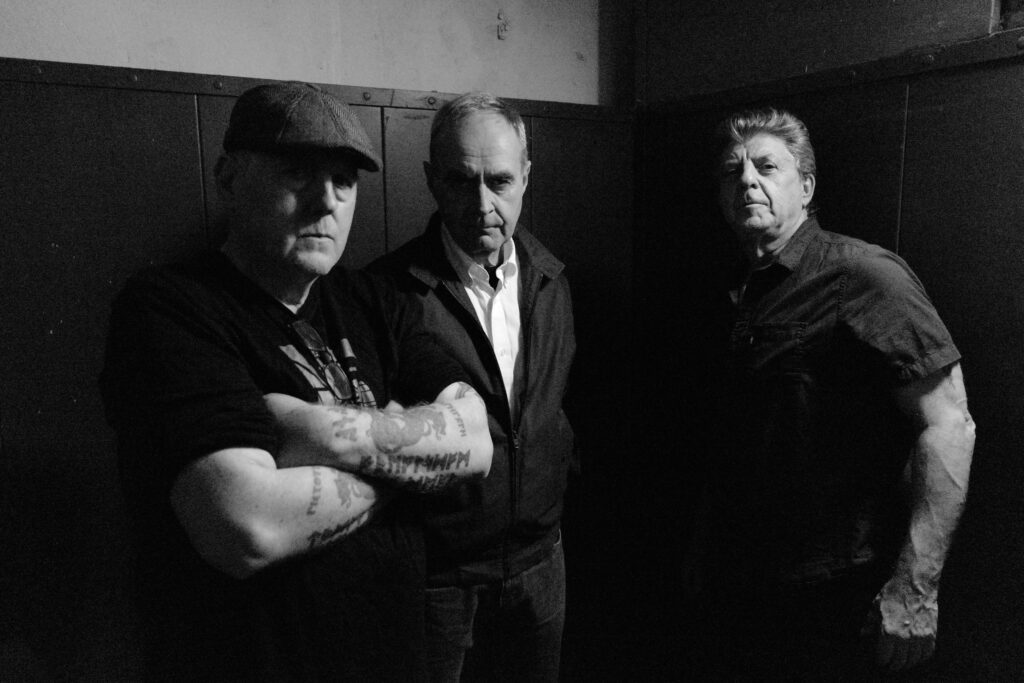

It has been a tough several years for the Chicago scene with the loss of not only John, but his brother Pierre Kezdy in 2020 and then Steve Albini earlier this year.
PZ: Yes, indeed, Pierre was one of my favorite people in the scene, his first band, Strike Under, debuted the week before us, and we played with them a lot back then. His loss was greatly felt by many in the Chicago scene and was another factor in The Effigies reuniting,
Pierre Kezdy photo by Meredith M. Goldberg
PZ: Steve Albini’s loss was felt worldwide. We, fortunately, had our 2-inch tapes baked and transferred at his studio 2 weeks before he passed. We had briefly discussed him remixing some of the early stuff. Steve was closest with John Kezdy and has always credited John and The Effigies as the reason he got started in music.
Steve Albini, left, with former Electrical Audio intern Nick Novak. Photo courtesy of Nick Novak
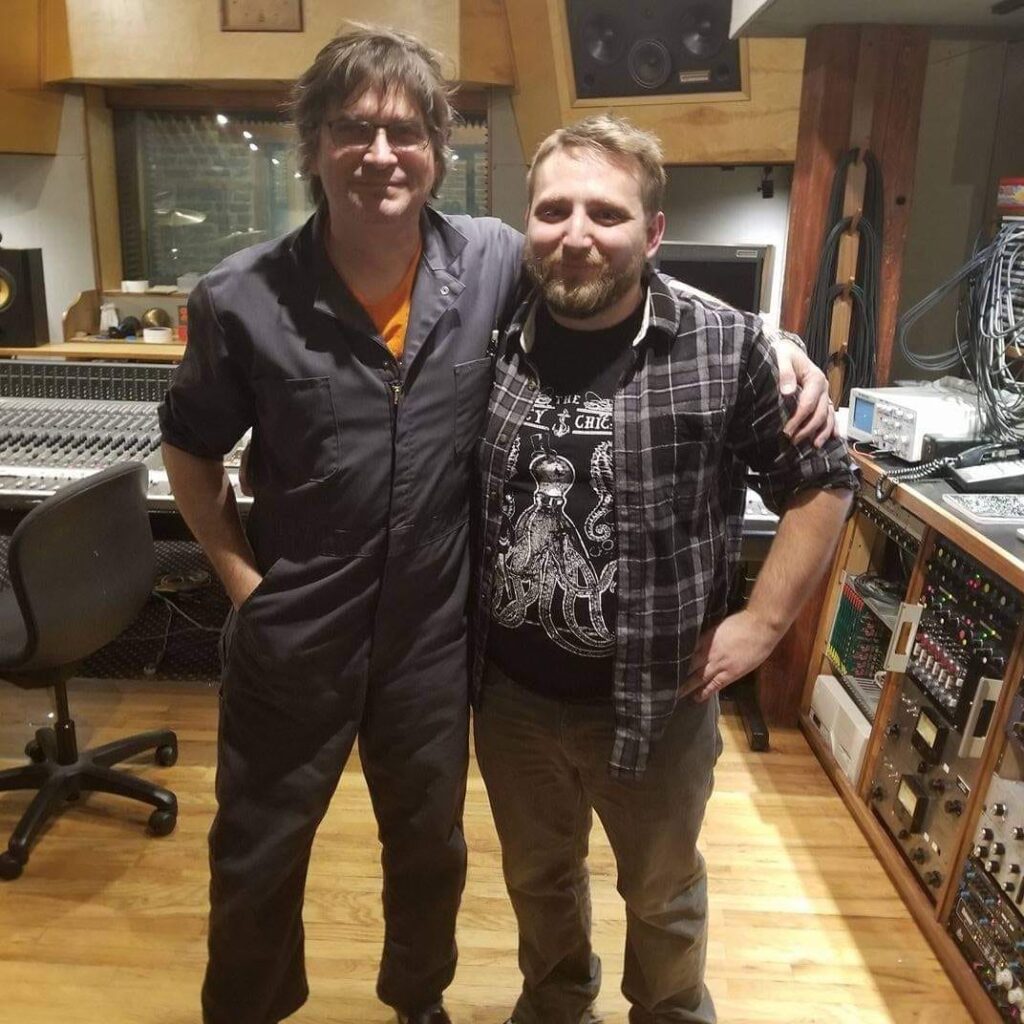
Last year, I spoke with Pegboy‘s Joe Haggerty about his time with John in the Effigies. Among his reflections, he had this to say:
“The coolest thing about punk rock is that I had this cool relationship with this fucking idol of the punk rock scene. I mean, not recognized by the rock and roll hall of fame, but who fucking cares.”
PZ: It’s cool that Joey got to fill in for a while, he got to play the now infamous Green Day show when they were starting out. Pegboy has always had a great relationship with The Effigies, and if all goes well, we may be playing with them in London next summer.
Any advice to musicians just starting out?
PZ: My advice to bass players is to never learn how to set up a drum kit! (rim shot) my advice to bands: I would say have fun because 99% of us won’t make it big. But the experiences you’ll have will make you rich. And never give up your dreams because some come true 45 years later.
Anything else you would you have Dying Scene readers to know about the band and the music, or you want to add about anything at all?
PZ: Thanks to all for writing about us and introducing us to new potential fans who we hope to see on Dec 20th, and for helping keep our dying scene ALIVE!
Burned was released in 2024: Per an official statement from the band:
“Cede The City” is taken from the forthcoming new album BURNED; lyrics in the song refer to the Highland Park shooting incident in July 2022 that original lead singer John Kezdy and his wife were involved in prior to his untimely passing.
The Effigies also released a 40th-anniversary edition of its seminal album For Ever Grounded.
In addition to the Chicago show, The Effigies is thus far scheduled to play shows at HQ in Denver, The Whisky A Go Go in West Hollywood, and in Blackpool, UK, at Rebellion Festival. Please check out the respective websites for further information on dates and tickets.
Thanks to Paul Zamost and Geoff Sabin. Dying Scene will see you at Metro.
Cheers!
